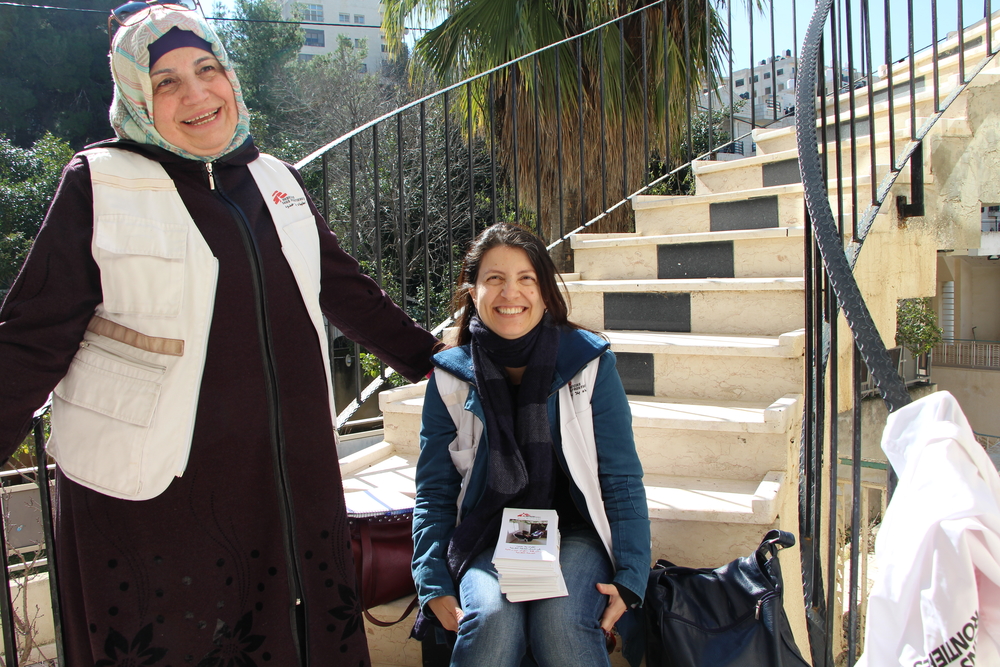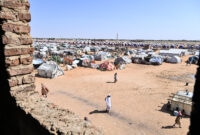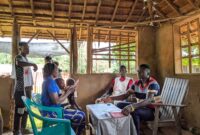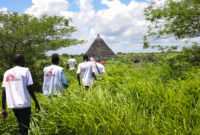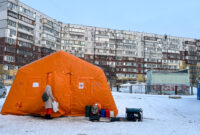International Women’s Day 2021: Self Care
We all want the power to invest in our wellbeing – to be able to take care of our emotional, physical and mental health. But without reliable information and appropriate tools, reasonable options and adequate support, it’s not always possible.
Self-care is changing the face of healthcare. It focuses on equipping and entrusting people to take a central role in their own health. For women, this can involve an important shift to being able to make decisions about their own care, when they may not have had this autonomy before.
In our programs, MSF too has seen how self-care can improve healthcare access and quality.
This International Women’s Day we want to share what self-care can achieve to empower women and girls in crisis-affected communities to enjoy healthier lives, just like women anywhere else in the world.
What is self-care?
The World Health Organization (WHO) defines self-care as “the ability of individuals, families and communities to promote health, prevent disease, maintain health, and cope with illness and disability with or without the support of a health-care provider.”
As a medical-humanitarian organization, MSF is adopting self-care within a patient-centred approach, supporting people with the knowledge and skills to undertake self-care safely but retain access to formal health services when they need or wish.
Self-care includes:
- Self-management of medication, treatment, examination, injection and administration
- Self-testing ranging from sampling and screening to diagnosis, collection and monitoring
- Self-awareness, spanning self-help, self-education, self-regulation, self-efficacy and self-determination.
Self-care is not about people having to do all their own healthcare without support; it is about entrusting people to manage parts of their own healthcare if they choose to do so.
Simplified tests and treatments, point-of-care devices and mobile technology have all made self-care more possible in recent years—with great potential benefit for women and girls.
Why is self-care important for women?
Globally, many women still do not have access to essential healthcare, and struggle with managing sexual and reproductive health issues that may be stigmatized.
Close to one in four women of reproductive age still has no access to modern contraception, to help her plan or limit her pregnancies. Just over half the people aged over 15 living with HIV around the world are women. Unsafe abortion remains a major cause of death in pregnant women globally who are unable to access a safe alternative.
The many social, economic, logistical and other barriers to accessing healthcare can be compounded by violence and discrimination. The situation is also aggravated in acute humanitarian crises. Now, Covid-19 has amplified the health service discrepancies in these settings, worsening sexual and reproductive health outcomes. And while lockdowns have been instigated to keep us safe, they have also increased the danger for some women at home.
In such circumstances, the obstacles can be so great that women will neither come nor ask for care, even if they need it.
Self-care is an opportunity to address this, as recognised by the WHO with its first ever self-care intervention guidelines in 2019, developed specifically for sexual and reproductive health.
How does self-care improve healthcare and health?
Self-care can expand access to healthcare in remote locations, unstable contexts or areas with poor health infrastructure. It can extend healthcare outside the hospital or the clinic, beyond the doctor or the nurse. It can be a pragmatic response where healthcare resources are stretched, but also enable links to care where they didn’t exist before.
Self-care interventions can deliver evidence-based and low-risk healthcare options directly and discreetly in the community or people’s individual homes – like self-injectable contraception. Offering more convenience or more confidentiality, self-care approaches can enable early diagnosis and more timely medical care—like HIV self-testing.
Through focusing on a woman’s individual needs, they can also improve the quality of care that she receives: care that is appropriate, respectful and built on trust.
For some women, self-care may be the only safe alternative, without which they may be forced to seek unsafe services, or give up hope of care altogether. In the case of self-managed medication abortion to prevent an unsafe one, self-care can be lifesaving.
How can women be empowered through self-care?
Self-care empowers women because it gives them access to information and services that allow them to decide on what works best for them. Women gain choices, and autonomy.
Self-care also allows women to help and take care of others in their community, by sharing reliable information peer-to-peer, delivering care as community health workers, and engaging with people within the same lived experience and health needs.
How is MSF supporting self-care?
In MSF, we’re currently building capacity for self-care as part of a patient-centred approach to healthcare. As the evidence base grows, we’re continuing to trial different interventions, to understand what works, for whom. We know that often it is communities that can lead the way, and no model is one-size-fits-all.
Whatever the self-care option, we will always ensure that women have access to a trained health worker when they want or need one, and can be referred to the next treatment step without delay.
This is extremely important, as self-care should not substitute for formal healthcare. It needs to be part of the continuum of care from the formal health system through to community-based models of care. It needs to add value, not stand in as second best for people otherwise excluded from care.
MSF has always innovated to overcome exclusion, and with women and girls as our partners we have the exciting opportunity to innovate some more.
Where is MSF integrating self-care into its projects?
In Ituri Province in the Democratic Republic of Congo, we’ve introduced the self-injectable, long-acting contraceptive known by its trademark Sayana Press. Long-acting contraceptive injections have been available in our clinics before, but now women can manage the injections themselves.
With guidance on how to handle a needle safely, and instruction on self-injecting by the clinical staff, women can take away up to four devices at a time to self-inject at home every three months. This ensures access to highly effective contraception for up to a year without repeat visits to the clinic, which may be simply time-consuming, or difficult in this conflict-affected area.
Sayana Press can be stored at room temperature and is easy to carry, which is helpful in this area where women and girls are often forced on the move. Women in Ituri like its simplicity and ease of use. About 3,000 doses of Sayana Press were provided to women in MSF projects in Angumu, Nizi and Drodro during 2020.
In MSF’s HIV, tuberculosis and sexual and reproductive health project for female sex workers in Malawi, which ran from 2014 to 2020, self-care was central to a peer-led model. Female sex workers in Malawi experience especially high rates of HIV and sexually transmitted infections, as well as sexual and gender-based violence, but face multiple obstacles to healthcare. Like sex workers in many other parts of the world, they’re disadvantaged by low social and economic status, discrimination and criminalisation. In Malawi we faced this head on by involving them directly in our comprehensive package of care.
Female sex workers joined the project to be trained as peer educators and community health workers. Their activities touched on all three pillars of self-care: self-awareness, through promoting self-education for example; self-testing, via home tests for HIV and other conditions; and self-management, including prevention of unwanted pregnancy after unprotected intercourse or sexual violence. This allowed female sex workers to have confidential access to information, care and other support around-the-clock from women like them, who understood their lives and their challenges. The community health workers then linked the women to the nearest ‘one-stop’ clinic for treatment and further support if necessary.
At the end of 2020, MSF handed over its activities to the Ministry of Health and several recently created sex worker community-based organisations lead by sex workers previously employed as community health workers by MSF in Malawi.
In Gutu district in Zimbabwe last year, our cervical cancer prevention and early treatment programme with the Zimbabwean Ministry of Health and Child Care was the springboard for a trial comparing women self-swabbing for human papillomavirus infection versus being swabbed by a nurse. Without better access to cervical cancer prevention, women in high prevalence countries like Zimbabwe continue to face a premature death.
The screening method known as Visual Inspection with Acetic Acid, the mainstay of our programme and others like it, needs human resources, training and equipment that can limit its roll-out. What if the simpler high vaginal swab to collect an HPV DNA sample could be effectively conducted not only by nurses, but the women themselves? It could significantly expand access to diagnosis for women unable to access healthcare workers or clinics.
The trial found nurses and lay patients equally effective in collecting a sample. Most women found the self-collection procedure comfortable; and almost all would recommend self-collection for HPV testing to a friend. We look forward to delving more into the preferences of women and nurses in participating in this care.
Great potential to expand
There is great potential to expand quality, patient-centred care for women and girls through self-care approaches, especially in contexts where MSF works: places affected by an acute crisis, or hard to reach. Self-care should always be linked to more formal care, but it can play a particularly useful role where there is little health infrastructure or few health workers, or marginalised people needing care outside of a formal system.
From our experience in such settings, working with health authorities, local organisations and grassroots communities, we believe much can be achieved to build the capacity to integrate self-care, and allow women and girls to contribute to their own health and wellbeing.
Let’s empower women and girls by trusting that given the right information and tools, they can engage in their own self-care to stay healthy, no matter where they live.
